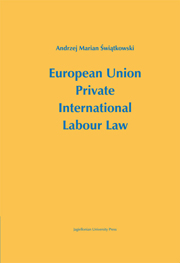Book contents
- Frontmatter
- Contents
- Introductory Comments
- Part I Preliminary Part
- Part II Conflicts of law of individual labour law in the light of the Rome Convention of June 19, 1980 and Regulation of the European Parliament and the Council of the European Communities No. 593/2008 of June 17, 2008 on the law applicable to contractual obligations (“Rome I”)
- Part III Conflict of law issues in individual labour law in light of the Regulation (EC) No. 864/2007 of the European Parliament and the Council of the EU (July 11, 2007), concerning law applicable to Non-Contractual Obligations (“Rome II”)
- Introduction
- Chapter 1 Lex loci damni
- Chapter 2 The freedom to elect an appropriate law for non-contractual obligations
- Chapter 3 Conflict rules of substantive labour law relating to specific non-contractual obligations arising from tort
- Part IV Conflicts of law in collective labour law
- Part V Conflicts of law in social security – the coordination of national social security systems of EU Member States according to the regulation of the European Parliament and Council Regulation (EC) No. 883/2004 of April 29, 2004 on the coordination of social security systems
- Part VI International procedural labour law of the European Union
- Selected bibliography
Chapter 3 - Conflict rules of substantive labour law relating to specific non-contractual obligations arising from tort
from Part III - Conflict of law issues in individual labour law in light of the Regulation (EC) No. 864/2007 of the European Parliament and the Council of the EU (July 11, 2007), concerning law applicable to Non-Contractual Obligations (“Rome II”)
Published online by Cambridge University Press: 05 September 2014
- Frontmatter
- Contents
- Introductory Comments
- Part I Preliminary Part
- Part II Conflicts of law of individual labour law in the light of the Rome Convention of June 19, 1980 and Regulation of the European Parliament and the Council of the European Communities No. 593/2008 of June 17, 2008 on the law applicable to contractual obligations (“Rome I”)
- Part III Conflict of law issues in individual labour law in light of the Regulation (EC) No. 864/2007 of the European Parliament and the Council of the EU (July 11, 2007), concerning law applicable to Non-Contractual Obligations (“Rome II”)
- Introduction
- Chapter 1 Lex loci damni
- Chapter 2 The freedom to elect an appropriate law for non-contractual obligations
- Chapter 3 Conflict rules of substantive labour law relating to specific non-contractual obligations arising from tort
- Part IV Conflicts of law in collective labour law
- Part V Conflicts of law in social security – the coordination of national social security systems of EU Member States according to the regulation of the European Parliament and Council Regulation (EC) No. 883/2004 of April 29, 2004 on the coordination of social security systems
- Part VI International procedural labour law of the European Union
- Selected bibliography
Summary
Unfair competition
Acts of unfair competition are governed by national legislation. Subjects capable of committing such acts are generally individuals or entities engaged in economic activity, service or business. In matters regulated by individual labour law employees, acting on their own behalf may behave in such a way that their action or inaction may be regarded as an act of unfair competition. According to Polish legislation, the Act of April 16, 1993 on Unfair Competition, states that an employee may commit acts of unfair competition, passing, disclosing or using someone else's trade secrets (Article 11 of the Unfair Competition Act), urging other workers to non-performance or improper performance of work duties (Article 12 of the Act) or disseminating false or misleading information about their employer (Article 14 of the Act). Assessing whether the acts committed by an employee may be treated as acts of unfair competition and assessing the legal consequences of acts committed in individual employment relationships involving an international element, are dealt with in Article 6 of Regulation No. 864/2007, which lists the determinants indicating the relevant national substantive labour law system of the country in which the unfair competition occurred, or there is likelihood the breach will occur. In matters relating to the regulation of the conflict rules of substantive laws, applicable to cases of unfair competition, the general principle expressed in Article 4, paragraph 1 of Regulation No. 864/2007 applies, reproduced in Article 6, paragraph 1 of the said Regulation.
- Type
- Chapter
- Information
- European Union Private International Labour Law , pp. 166 - 170Publisher: Jagiellonian University PressPrint publication year: 2012



